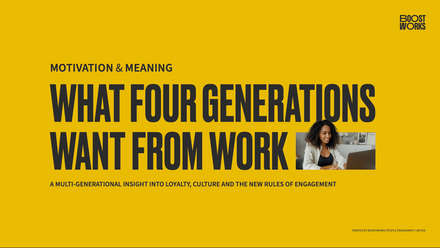Why flexibility should include all workers – not just those with desks
Remote and hybrid employees worldwide are consistently more engaged than onsite workers, according to Gallup’s Global State of the Workplace 2023 report, correlating with higher productivity and performance.
The report shows how the link between greater flexibility at work and higher levels of employee engagement are becoming better understood.
However, not all organisations are fair in their approach to flexibility, leading to problems ranging from recruitment issues to poor employee wellbeing. That’s why making flexibility equitable for all is so crucial.
Flexibility helps employees feel seen and valued and builds excellent workplace cultures.
The flexible bonus
When people are satisfied with their level of flexibility at work, they are 568% more likely to promote their organisation to others as a great place to work, and 384% more likely to stay with their organisation another year, according to O.C. Tanner’s 2024 Global Culture Report.
On the flipside, the odds of burnout increase by five times when employees are dissatisfied with their level of work flexibility.
Employees want choice in how they accomplish their work, some autonomy over their time at work and some time for interests and skills outside work. This level of flexibility used to be seen as a workplace perk but is now becoming an expectation – and it must become equitable for everyone.
Some organisations may acknowledge the value of flexible working but only offer it to some employees. For example, flexibility may be offered to desk-based employees but not to deskless employees. After all, you can hardly stack shelves or drive a lorry from home.
However, organisations can still offer greater flexibility for all employees regardless of job role. It just takes an understanding of what employees may want out of flexible working and a willingness and commitment from the organisation and its leaders.
Deskless workers want to be included
According to O.C. Tanner’s report, deskless workers are aware of the limitations for flexible working in their job roles and often want different types of flexibility to their desk-based counterparts.
For example, deskless workers tend to be most interested in time for personal development. For desk-based workers, the main priority is autonomy in how to accomplish work. This is followed by working where they choose. So flexibility doesn’t mean the same for every employee.
To ensure employees all have some flexibility in their roles, organisations must explore providing everyone with equitability and what this may look like. Knowing employees’ unique needs is important here and so having regular one-to-one meetings between leaders and employees can help to better understand each employee and find out ways to increase flexibility.
It’s also important to allow all employees to take time away from work when needed. This could include empowering leaders to adjust work schedules to fit changing life circumstances, providing time for personal appointments and events, setting aside hours for skill building and training, or giving employees opportunities to work from home when possible.
Beyond flexitime
And, finally, organisations should offer employees more than just flexitime, as flexible working is so much more than this. Employees crave influence on what work they do and how they do it and so leaders must provide flexibility in tasks and training, as well as opportunities to take part in learning and development programmes.
Equitable flexibility is crucial if organisations are looking to create thriving cultures. With employees eight times’ more likely to stay with their organisation another year when flexibility is equitable, providing all employees with a say in where, when and how they perform their work should be an organisational prerogative.
Supplied by REBA Associate Member, O. C. Tanner
The worldwide leader in employee recognition solutions that help people thrive at work.








